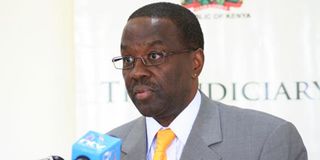Media, newsmakers love-hate ties good

Chief Justice Willy Mutunga during a past event. PHOTO | PHOEBE OKALL | FILE |
What you need to know:
- Ordinarily, a love-hate relationship exists between the media and newsmakers.
- Justice Emukule said members of the Fourth Estate claim to be the voice of the people, keeping government in check.
It is generally assumed journalists are corrupted by gifts of money, the so-called brown envelope culture. But there is another side. A British editor, Sir John Junor, suggests journalists are not corrupted by money but by friendship.
So the object lesson is that journalists should not be intimately friendly to newsmakers. Journalists should not get too cosy with newsmakers for fear of being compromised. Journalists who get chummy with newsmakers soon find their ability to report freely is curtailed by their friendship.
Ordinarily, a love-hate relationship exists between the media and newsmakers. Politicians, for example, love the media when they give them favourable publicity and hate them when they expose them in unfavourable light.
While we cannot say definitely a love-hate relationship exists between the media and the Judiciary, what Chief Justice Willy Mutunga said on Monday last week indicates ups and downs. He said judges exercise considerable restraint in the face of unfair and defamatory reporting. He warned that carrying images and stories that are defamatory against judges and courts “would attract huge legal penalties.”
His expectation was “not that the media will do us any favours” but “an honest and professional relationship”.
No illusions there about a love-and hate relationship. Such a relationship is likely to come about because the media is the Fourth Estate, which plays a watchdog role, and is sometimes perceived as abusing its role.
But it’s pertinent to ask who appointed the media the Fourth Estate? Nobody, really. However, Nakuru resident judge Anyara Emukule, who spoke two days after the Chief Justice, left no doubt that judges are keenly aware of the reasoning behind the term.
In a keynote address to some 30 court reporters gathered at Sentrim Elementaita, he spoke of Edmund Burke who, looking up at the Press Gallery of the House of Commons, said:
“Yonder sits the Fourth Estate and they are more important than them all”. Burke was referring to the three traditional British classes or estates — the nobility (Lords Temporal), clergy (Lords Spiritual), and commoners (House of Commons). Thereafter the media was nicknamed the Fourth Estate.
Justice Emukule could have gone further — but he didn’t — to quote Oscar Wilde who said the media was a bully. “In old days men had the rack. Now they have the Press,” he said.
“That is an improvement certainly. But still it is very bad, and wrong, and demoralising... [At] the present moment it really is the only estate. It has eaten up the other three. The Lords Temporal say nothing, the Lords Spiritual have nothing to say, and the House of Commons has nothing to say and says it. We are dominated by Journalism.”
On his part, Justice Emukule said members of the Fourth Estate claim to be the voice of the people, keeping government in check. But they lose that claim when they depart from “accurate and objective reporting and analysis of issues”.
The love-hate relationship between the media and newsmakers is inevitable, probably even necessary.





